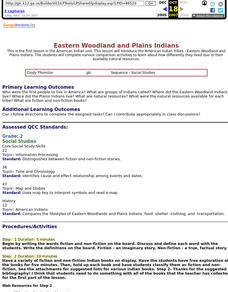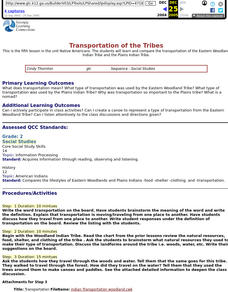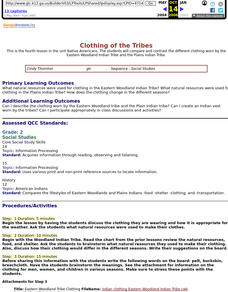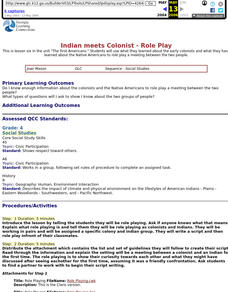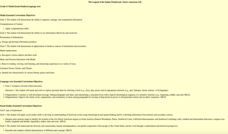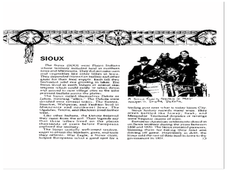Curated OER
Eastern Woodland Indians
Fifth graders research the Eastern Woodland Indians in this lesson plan. They list the tribes and write a description of the physical environment. They list examples of the types of food, clothing, transportation, home/shelter,...
Curated OER
Eastern Woodland and Plains Indians
Second graders are introduced to the American Indian tribes - Eastern Woodland and Plains Indians. They complete various comparison activities to explore how differently they lived.
National Endowment for the Humanities
Not 'Indians,' Many Tribes: Native American Diversity
Students explore what they thought they knew about "Indians." They examine the Hopi, Abeneki and Kwatiutl tribes in a game-like activity using archival documents.
Curated OER
Transportation of the Tribes
Second graders compare the transportation system of the Eastern Woodland Indian Tribe and the Plains Indian Tribe. They use a chart imbedded in this activity to further their understanding of the Plains Indians, then engage in a craft...
Curated OER
American Indian Tribes
Second graders explore two Indian tribes. They explore how tribes lived using natural resources. They compare Eastern Woodland and Plains Indians.
Curated OER
Indians of North America
Students, after investigating Indians of North America, give examples of early cultures and settlements that existed in North America prior to contact with Europeans. They identify and compare historic Indian groups of the East,...
Curated OER
American Indians and Their Environment
Students create a storyboard of the three American Indian language groups showing the geography of where they lived and how they adapted to the environment. They compare European and American Indian views of nature and explain how these...
Curated OER
Cumulative Game on Native Americans
Second graders complete a written activity as well as play a review game about the Eastern Woodland Indian tribe and the Plains Indian tribe - natural resources, food, shelter, clothing, transportation, etc.
Curated OER
Clothing of the Tribes
Second graders compare and contrast the different clothing worn by the Eastern Woodland Indian Tribe and the Plains Indian Tribe.
Curated OER
Viriginan American Indians
Students complete a KWL chart about the American Indians using graphic organizers from websites. They read a teacher-selected book about the early Virginia American Indians and then read Becoming a Homeplace from the Virginia Historical...
Curated OER
Native American Trivia Book
Fourth graders research information about the Eastern Woodland Indians for a class trivia book. They Save, proofread, and print out their trivia sheet and design a cover page for the book.
Curated OER
American Indians
In this American Indians worksheet, students read a 2 page article on American Indians, answer 6 statements as true or false and fill in 8 blanks in 8 facts referring back to American Indians.
Curated OER
Indian Meets Colonist - Role Play
Students role play as colonists and Indians. They are assigned a specific colony and Indian group, and write a script and then role play in front of their classmates.
Curated OER
The Affects of Environment on Native American Culture
Young scholars research the culture of the Native Americans. In this U.S. History lesson, students are given the major geological areas where the Indians lived prior to the arrival of the Europeans, then they create a notebook that...
Curated OER
Native American Indians: Wampanoags
Students understand the contributions of the Native American tribes. In this Native American lesson, recognize Native American names, words and cultures. Students understand that different tribes lived in different parts of the country....
Curated OER
The Legend of the Indian Paintbrush: Native American Life
Young scholars read," The Legend of the Indian Paintbrush" by Tomie dePaola and discuss the way legends are passed down orally. They then create their own legend and illustrate it on a simulated "Buffalo Skin" made from brown paper.
Curated OER
People for the Land: Native Americans in Iowa
Learners identify Iowa's American Indian cultures and complete a research project for the topic. In this Iowa's American Indian lesson, students research read the background information about tribes in Iowa and complete a research...
Curated OER
Our Native Americans
Students complete a unit of lessons on Native Americans. They label maps, list resources the Native Americans used in their daily lives, create an original short story, define key vocabulary, and develop a model of something that...
Curated OER
The Great American Desert
In this American deserts worksheet, students study the images and read the passages to learn about the 6 divisions in the American landscape: the Eastern lowlands, the Flood Plain, the Great Plains, the Rocky Mountains, and the Pacific...
Curated OER
Native American Music: Call-and-Response
Students are introduced to call-and-response form of Native American song and dance. They identify and describe a call-and-response form as used in "0 Hal'Lwe."
Male students will perform "0 Hal'Lwe" in call-and-response style with drum...
Curated OER
Comparing Cinderella and The Rough-Face Girl
Pupils examine similarities and differences between cultures. They'll see that literature, reading, and story telling is something all cultures have in common. They should construct Venn diagrams to help them compare and contrast the...
Curated OER
Owl Eyes.
Students create an animal with clay and use toothpick to draw or carve features. Students write descriptions of their animal and tell why they created it in a certain way. Students write legends on their own, perhaps using their created...
Curated OER
Earliest Americans
Students study the Earliest Americans. In this interactive lesson on the Native Americans, students study different tribes over the course of seven lessons. Students culminate their studies with a presentation and assessment.
K12 Reader
Customs and Traditions
Here's a two-part reading comprehension worksheet that asks kids to read a short passage about the customs and traditions of Native American tribes and then to answer a series of questions based on the article.



